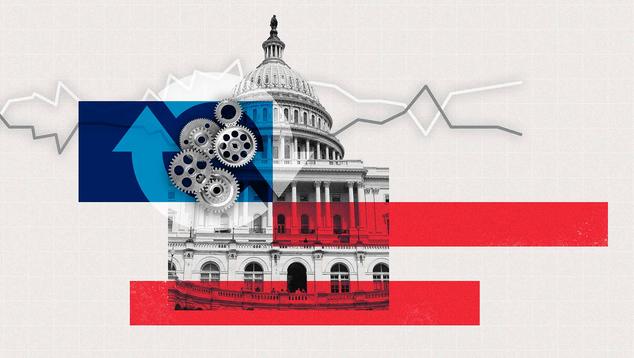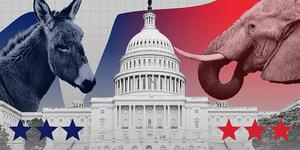President-elect Donald Trump’s plans for his new administration include creating a “Department of Government Efficiency” headed by entrepreneurs Elon Musk and Vivek Ramaswamy. Although the precise details are still to be determined, the announced objective is to make the federal government more effective, efficient and limited in scope.
I haven’t seen any new polling that directly asks Americans about the proposed government efficiency department. But a review of existing data suggests Americans are and will be broadly supportive of the initiative -- at least in concept.
Americans Support a Reduced Role for Government
For decades, Gallup has tracked a question focused on the issue of government’s role in society. The results provide continuing evidence that Americans, on balance, prefer a smaller government doing fewer things.
As always, it is important to consider how questions are worded when analyzing public opinion about broad and complex topics. In this instance, Gallup’s question asks Americans to choose between two alternatives: A) “Some people think the government is trying to do too many things that should be left to individuals and businesses” or B) “Others think that government should do more to solve our country's problems.”
Gallup has asked this question annually over the past 24 years. On average, 52% of Americans have said the government is doing too much, compared with 42% saying the government should do more. (The rest have mixed opinions or don’t know.)
Only twice have more Americans chosen the “government should do more” alternative over the “government doing too much” alternative -- in 2001 after the 9/11 terrorist attacks and in 2020 after the outbreak of COVID-19.
Our latest update from September shows 55% of Americans say the government is doing too much, with 41% saying the government should do more -- a 14-percentage-point gap, slightly greater than the overall trend average.
This question is, in essence, a litmus test of Americans’ underlying ideology. Views on the appropriate role of government in society are one of the core attitudes defining and undergirding Americans’ more general ideology. An overwhelming 81% of conservatives in September said the government is doing too much. Liberals’ views are the opposite, although not as one-sided as conservatives’ -- 67% say the government should do more, and 25% say the government is doing too many things. Moderates are split (49% say too much, 46% too little).
The differences among Republicans, independents and Democrats show very similar patterns.
Beyond ideology, there is an indication of self-interest in responses to this question. Lower-income Americans benefit from government income transfer programs and are more likely than those with higher incomes to favor the government taking a larger role in solving problems.
An analysis of aggregated data collected since 2001 shows the impact of income on views of the government occurs mainly among Republicans and independents who lean Republican. Lower-income Republicans are more likely than higher-income Republicans to say the government should do more to solve problems. Notably, however, even among lower-income Republicans, the percentage saying the government should do more is well below the majority level. Democrats’ belief that the government should do more is constant regardless of income.
In short, despite some variation by income among Republicans, views of the role of government differ widely by party within each income category. Party identification retains its powerful influence on attitudes about the government regardless of one’s income.
Seniors benefit significantly from the government’s Social Security and Medicare programs. However, Americans aged 55 and older are no more likely than those aged 35 to 54 to want a higher level of government involvement. Over the past several years, Americans below the age of 35 have become the most likely to say the government should do more.
Younger Americans’ relatively higher interest in government intervention to solve problems is most evident among Republicans. As was the case for income, Democrats are relatively consistent in their belief that the government should do more, regardless of their age. (This reflects the general pattern by which Republicans’ attitudes about a number of issues fluctuate more over time and across subgroups than is the case among Democrats.)
In summary, Americans’ party identification remains a powerful factor related to their views of government, across age categories.
Making Government More Efficient
Available evidence shows that a majority of Americans believe the government is inefficient and wasteful.
These negative perceptions reinforce or arise from Americans' broadly negative attitude toward their federal government in general. For example, Gallup’s annual update on the images of business and industry sectors shows that Americans’ views of the federal government (26% positive, 58% negative) are second from the bottom of all 25 industries tested, only slightly above the lowest-rated pharmaceutical industry.
Other measures document the negative way Americans view their government. These include low trust in all three branches of the federal government, low trust in the government's ability to handle domestic and international challenges, frequent mentions of the government as the most important problem facing the nation, and perceptions that the government has too much power.
Given this context, it isn’t surprising to find that Americans, when asked, say the government is inefficient and wasteful. A Pew Research poll in April, for example, showed that 56% of U.S. adults agreed that the government is “almost always wasteful and inefficient.” Gallup polling earlier this year showed that 58% of Americans are dissatisfied with the size and power of the federal government. A slight majority of Americans say the government has too much power. Seven in 10 Americans in 2019 agreed that businesses can do things more efficiently than the federal government. And older Gallup research has shown that Americans think at least half of all money spent by the federal government is wasted.
Implications
As we have seen, majorities of Americans view the federal government negatively, believe the government operates inefficiently and ineffectually, and feel that the government -- effective or not -- is attempting to do too much in our society.
These views are measured at the macro level, reflecting questions asking Americans about “the government” in a broad sense. Americans’ generally negative attitudes toward the government thus provide a generally favorable context for efforts to reform it.
Efforts to reform the government are not new. President Ronald Reagan, in the 1980s, created the “Grace Commission,” which focused on reducing waste, improving personnel management and attacking structural deficiencies within the government. President Bill Clinton, in the 1990s, charged Vice President Al Gore with creating a National Partnership for Reinventing Government. The Biden administration has taken “historic steps to accelerate and improve the federal permitting process.”
These efforts face the challenge of addressing a huge, multifaceted federal bureaucracy that touches Americans in many different ways. As I reviewed two years ago, the government provides benefits for Americans across a wide variety of functions. Estimates show that Americans received $3.8 trillion in income benefits from the government in 2023. These income transfer programs are coupled with the indirect benefits that come from the government’s involvement in safety regulations, the military, defense, and such things as air traffic control, food safety and mail delivery.
Thus, the challenge for the proposed Department of Government Efficiency is not so much its overall objectives but rather how the efforts to reach those objectives are operationalized. Like curing cancer, eliminating poverty, preventing terrorist attacks or ensuring that no child is left behind, the idea of making the government work more efficiently gains general public approbation. However, as is the case for all of these worthy objectives, actually accomplishing them is where the difficulty arises.
In some ways, the success of the Trump administration’s government efficiency initiative will depend on the effectiveness and efficiency of the reform effort itself.
One of the two men appointed to head the Department of Government Efficiency, Elon Musk, has a history of dramatic, disruptive changes in the companies he owns. How well this approach works for the federal government -- and for the entire population of Americans who are, in essence, the government’s client base -- will be fascinating to monitor going forward.
To stay up to date with the latest Gallup News insights and updates, follow us on X @Gallup.




